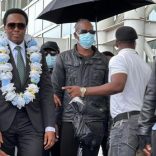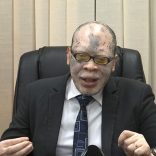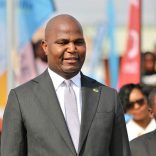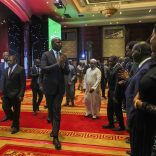Mozambique: Justice Ministry says analysing process for the legalization of Mondlane's party
The current situation of Mozambique through the eyes of Father Couto

Jornal Domingo / Father Filipe Couto
A week ago Radio Mozambique interviewed Liberation struggle veteran Father Filipe Couto, former Rector of the Catholic University of Mozambique and of Eduardo Mondlane University. Now, with all due acknowledgements, O Domingo has published the text.
Mozambique has been independent for 41 years. From the social and political point of view, how do you view the evolution of our country in these more than four decades?
The country has moved forward. You have said correctly that it has been 41 years, and a lot has happened in the country. Mozambique has institutions that are operating, and can operate better. It has human capital, it has young people. There is reason to look to the future with optimism. It is only necessary to have your feet on the ground, keep our head up and try to act the correct way. To be a country that puts ethics, morals, first and where everything is done so that those who are in politics work for the common good.
What can the country be proud of and what are the exciting prospects for the future, particularly in the social and political aspects?
What I am proud of is that, after 41 years, we have a new president who is not from my generation, who did not fight in the liberation struggle against the Portuguese colonial regime, even though he was born in an environment where there were former combatants. A president who was formed and grew up, somewhat, with former combatants, but later entered into “normal” institutions, which were not under the pressure of war. So after 41 years we have a young president. The young people of your generation may well be proud of this and claim that they are in power. With better eyes, ears, age, health and education compared to his predecessors. The country has changed. It is not a Mozambique that repeats all the mistakes we have made in those 41 years. When I talk about mistakes, I do not say that we just made mistakes. We have also done good things which our young people must now take forward.
The official discourse today points to the need for all Mozambicans to make united efforts to make development a reality. Do you see the reaction to this challenge repeated enough in our society?
In society a lot is repeated. It is said that things do not work. I also agree that a lot does not work, but I get the impression that people who think nothing works blame only one individual, namely the President of the Republic, in this case Filipe Nyusi. But he is an individual who can inspire good; it is not he who makes the changes.
Everything should start in the institutions we have, such as Education, Health, Safety, Interior, Defence, Labour, Energy. We [Mozambique] cannot move forward when institutions in the service of the state function in the same way as in those times. That is something that must change, for it is no longer justifiable for things to go on like this, but that does not depend on the President alone. These are things that we must do and there are those who must put pressure on for this to work: in this case, educated young people who know their rights and duties.
People talk about the longed-for development process, limiting themselves to criticising everything that is done or not done by the Government. What do you think about these positions?
that youth only criticises… I do not agree that youth only criticises. Today, those who criticise are not the young, those who criticise may even be us, who are older. We use the youth, telling it directly to say this or that through the internet and social media networks.
Are you saying that youth is being manipulated in some way?
Certainly. Youth has never been as manipulated as it is today. And this is done through technology, media, cell phones, computers, social networks. That is, all these things are one great manipulation, making it difficult for the young people to reach into his or her own heart and think about what he or she is. The young person thinks that what the media says is what he is. And you can not find yourself as a young person and see what you really are in the environment in which you live.
In this sense, saying that young people only know how to criticise is not correct, because there are those who have the mastery of the media and manipulate society and young people. It is rare to find a young person currently talking about things he has not heard or read. One who speaks what comes spontaneously to his soul. There was never a time where there is [such a] need for the young person to find moments in which to isolate him or herself from the telephone, from social networks, television, radio and everything, and think a little about the workings of his or her surroundings
Think about what happens in the family, the rise in price of bread, sugar, why and how it can be overcome, for example. The answer does not have to come from social networks. There is something here that shows us how much manipulation there is and how it is necessary to enter into ourselves as individuals and find moments to reflect on what is happening, not act as if we were robots or dolls that are operated from behind the scenes.
Do you believe that the goals of those who manipulate young people are not to develop the country?
I do not say that these people are doing this intentionally or with malice, but it is the way the dialogue spreads among people, in the news. It is not easy to find people who have opinions or thoughts of their own. Almost everyone hears everything from somewhere or someone. I’m sorry, where are we? I mean, without WhatsApp, BBC, Voice of America, are there no thoughts? Where are we?

Do you think that social vulnerability in our country suffers from problems that make it destructive?
The country is an anonymous thing. There needs to be groups of young people who begin to think seriously about what is happening at home, on the block, or where they are, and see how they can handle the message themselves and not always expect someone to solve the problem. It is not right to expect the President to do everything himself. We are more than 25 million people; this is too much for one single head.
How do you interpret the criticisms made by many sectors of society of the current Head of State?
Honestly, for me, I think there was no better era in our country than now, where we have that possibility and we see the President criticised. I am glad to have never heard that the President is wanting to sue someone who has spoken ill of him. He always lets things go forward. This is good. Mind you, I am not saying that the country should not use force (defence, police), but respect for authority should not be imposed. It must come because we have seen that it is necessary to accept authority if we want to go forward.
For two years now, socially the President is only criticised. Very few people point out what he does well. Unfortunately, criticism is being served up by media technicians, which gives the impression that whoever has the authority to speak and use these media is happy to always speak of the President or the presidency as if it were something that does nothing . But this is not how we are going to build a new Mozambique. The danger, in this moment of transition, is that everything is lost.
What is the risk of losing everything when criticism is at these levels, particularly in relation to the State?
I’ll explain this historically. The Christian Democrats in Italy were a well-disciplined party, had well-educated people and enjoyed good times, but when within the party they began to enter a certain repetition among those in power, within a short period of time Christian Democracy was undone and in came another merchant, Berlusconi. The Soviet Communist Party, after fifty years, was finished. A new team came in, but then the communists themselves wanted to launch a coup against Mikhail Gorbachev, so it turned out that a case had to be brought against the Communist Party and it became illegal. They went home. This means that if we only criticise, we will end up undoing Frelimo and then there is nothing.
Do we want to put the thing to chaos, into disorder… Then we will have to work to set matters right again? The most exemplary way it would be, okay, there’s a new person there, let’s support him, criticise him objectively. One must know that everything does not depend on this new person, but we are in an era in which old schemes that Frelimo had already passed. What amazes me is that even us, former combatants, instead of being clear that things can end up this way, and so we should support our young man, seems like it is us fomenting … Excuse me.
So you assume now that there are bad intentions in thee model of approach you are criticising?
No. I myself often fall into this trap, into this way of thinking. It is easy to talk like this here but in my private life I sometimes criticise Nyusi.
… implicitly?
Implicitly or even speaking without thinking about the consequence of what I am saying. There is a lot of what I was talking about before missing: silent reflection to know what it is I am saying and doing, what we are all doing.
Father Couto, we are focusing on criticism, merit and demerit, particularly in Mozambique. In your opinion, how can we have constructive criticism?
Constructive criticism … Let’s see. Who does not say that he wants peace here in the country? Everyone says they want peace, peace, peace! But the young President went to the Indy Village to meet Afonso Dhlakama. He was the first to arrive and waited for the Renamo leader. It happened that members of the Political Commission went to the provinces to say that one could not talk with Dhlakama in just any way. Well, they were convinced of that, but that young man went to Dlakhama to start making peace!
Then they keep on saying, ‘we want peace, we want peace, we want peace’ … But, excuse me? This one you’re asking for peace, do you not remember that he went to Indy Village to wait for Dhlakama and has been criticised for it? Why not say: we thank you for going to meet Dlakhama, but this is not everything, you have to do much more? That is, to give more suggestions, for example, to let Dlakhama be in Gorongosa, where he likes to be and to acknowledge his status there, because he prefers to stay there instead of being with big people. I think we should begin to recognise the efforts made by Nyusi.
You said recently that the best way to solve the country’s current problems will be a reform undertaken by young people. Given the scenario that characterises the youth, that in your opinion youth is being manipulated, do you think we are in a position to implement this reform?
We are fully fit. There is no need to make noisy demonstrations. No shotguns are required More reflection and determination of programs is what is needed. For example, why not listen to the young President when he says he wants to bank on food production in the country?
Um … specialisation of each province in a given agricultural product?
Yes. But let us not talk. Think about it, take it and tell him how to do it. He wants to do something good. He continually says that this is his plan. And remember one thing. Out of about 25 million Mozambicans, don’t think that there is nobody who likes him, although some want to give the impression that he has lost popularity.
Speaking of which, do you feel that the President lacks the necessary support from Mozambicans?

No. The little man in the district does not say it’s Nyusi’s fault. He is upset or does not accept how the local organs handle the issues, how the President will put an institution in Chiconono, Sanga, or Khongolote in its place. How is he going to solve the problem of a dead man and the police arrest the suspect but the judiciary says he can’t be sent to prison and sets him free? It is the organs of propagation of images, news. There, those who are behind it are certainly not only young; there are people who have the influence and the money to make it possible and manipulate the majority.
Mozambique is experiencing social, political and economic unrest. What measures should, in your opinion, be taken to end this scenario in the medium or even the short term?
I believe that talking as if we were talking about something that does not belong to us is coming to an end. I believe that, for example, what happened in Nosso Banco touched a lot of people and our job is to question why the organs of justice have done nothing in this situation? I believe this will come to an end because people slowly understand that the future depends on us. The future depends on me, on you, on each of us and on those who are in union with us to work. When that happens to the fullest we will forget the time that has passed because the changes will be instantaneous. History is made up of things that happen in a very short time, but that have resonance. I think the citizen already knows that to deposit money in the bank, we must be careful, they have instantly learned from what happened in Nosso Banco. It happened because we have a young President who let the news come to the surface. He did not have to hide it, he let it be made public. Is this not a good thing? So my message is that this can help us see how we can go forward by supporting this young man who is starting something good.
What can we expect from the future of our country, taking into account all the aspects we have covered in our conversation?
I can only hope for a better future for Mozambique and it is a better future that is in your hands, young people, with a young President. You will not fold your arms and let things go wrong. But it’s not just the President that will do it, it’s us, because we want something better than this. There has never been a time that would indicate that Mozambique will move forward like this.
Is the future bright in your opinion?
The future is right. It’s good. But we have to work and gossip less. Have morality, justice and consistency. Furthermore, we combatants must give confidence to young people and not live in fear, thinking that young people are only foolish. No, sir! Of course they make mistakes, but they have the possibility of making Mozambique a better country.












Leave a Reply
Be the First to Comment!
You must be logged in to post a comment.
You must be logged in to post a comment.